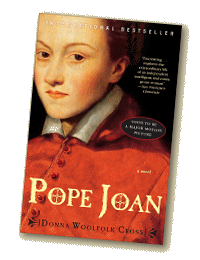 |
Donna Woolfolk Cross makes Pope Joan the protagonist of her book of the same name. She tells her story beautifully with a researcher's gift for very detailed descriptions of how life and the church was in the dark ages, and yet, at the same time, the novelist's eye and ear is at work. She feels the flow of events in Joan's life with great sensitivity, after all, ninth-century Europe was a difficult time in which to live, especially for women. Women were not allowed to read or write. Any woman or girl-child shown expressing a curiosity in reading or in how things worked, was considered to be 'possessed'. If a girl ever questioned a decision made by the male member in the house, or showed signs of questioning age-old traditions or rituals, they were whipped until they submitted.
Cross portrays Joan as one of three children raised during this bloody time by Gudrun, a "heathen" woman and a survivor of the brutal Saxon massacre, and her husband, an overzealous Christian canon. So blind was he from ignorance and misplaced Christian fervor, that Joan, their only daughter, is cruelly mistreated by him for her attempts to utilize her intelligence. Despite the abuse to which she is subjected, she refuses to take on the role of the submissive daughter and sister.
After Vikings savagely attack the village, Joan, the lone survivor, adopts the identity of her younger brother, John, who had been killed in the attack. Joan eventually has to disguise herself as a man to escape punishment for aspiring beyond her station as a female. She becomes Brother John Anglicus. Along the way she takes shelter at a Benedictine monastery where she learns medical skills from an elderly monk.
 |
Unfortunately Joan's reign as Johanna Papissa is short-lived. Two years after she becomes Pope, there is an uprising of a rival contender to the Papacy and her lover Gerold is killed while defending her. The shock results in her going into premature labor giving birth to their to their stillborn child. It was only then that people found out that their Papa Populi or the people's pope had been a lady!
 |
"...for, as it is well known"-Odo's voice assumed an authorative ring- "St. Paul himself has asserted that women are beneath men in conception, in place and in will."
"In conception, in place and in will?" Joan repeated.
"Yes." Odo spoke slowly as if addressing a half-wit. "In conception, because Adam was created first, and Eve afterward; in place, because Eve was created to serve Adam as companion and mate; in will, becase Eve could not resist the Devil's temptation and ate of the apple."
Odo smirked. Joan felt an intense dislike for this man. For a moment she stood silently tugging on her nose.
"Why," she said at last, "is woman inferior in conception? For althoug she was created second, she was made from Adam's side, while Adam was made from common clay. In place, woman should be preferred to man, because Eve was created inside Paradise, but Adam was created outside. As for will, woman should be considered "superior" to man for Eve ate of the apple for love of knowledge and learning, but Adam ate of it merely because she asked him"
"In conception, in place and in will?" Joan repeated.
"Yes." Odo spoke slowly as if addressing a half-wit. "In conception, because Adam was created first, and Eve afterward; in place, because Eve was created to serve Adam as companion and mate; in will, becase Eve could not resist the Devil's temptation and ate of the apple."
Odo smirked. Joan felt an intense dislike for this man. For a moment she stood silently tugging on her nose.
"Why," she said at last, "is woman inferior in conception? For althoug she was created second, she was made from Adam's side, while Adam was made from common clay. In place, woman should be preferred to man, because Eve was created inside Paradise, but Adam was created outside. As for will, woman should be considered "superior" to man for Eve ate of the apple for love of knowledge and learning, but Adam ate of it merely because she asked him"
In the afterword, Cross dicusses the legend of Pope Joan, explaining the historical and circumstantial evidence that led her to conclude that a Pope Joan probably really did exist.
I highly recommend "Pope Joan" to those readers who enjoy brilliantly-crafted stories about strong women who fight against the social restrictions and injustices heaped on them and go on to live extraordinary lives. The story of Pope Joan will be an inspiration to many women; read and be moved to do something extraordinary in your own life.
